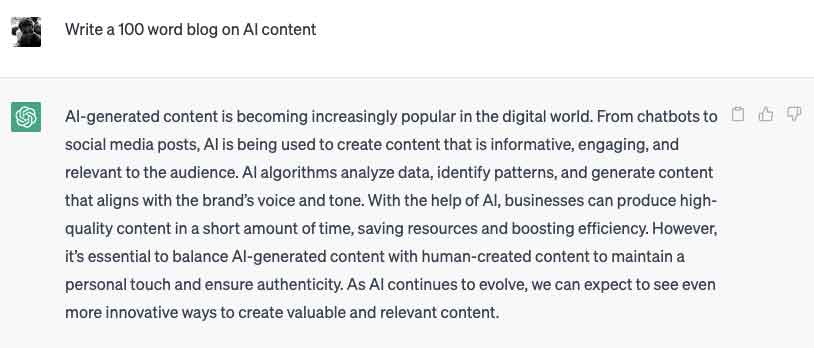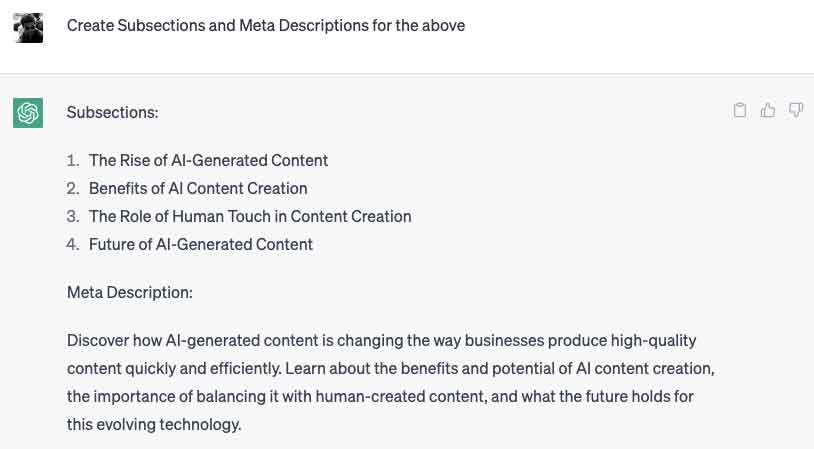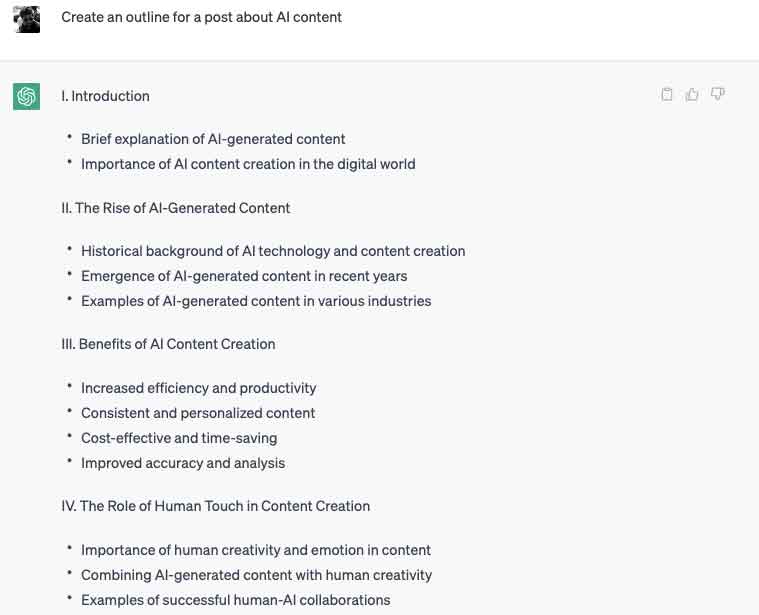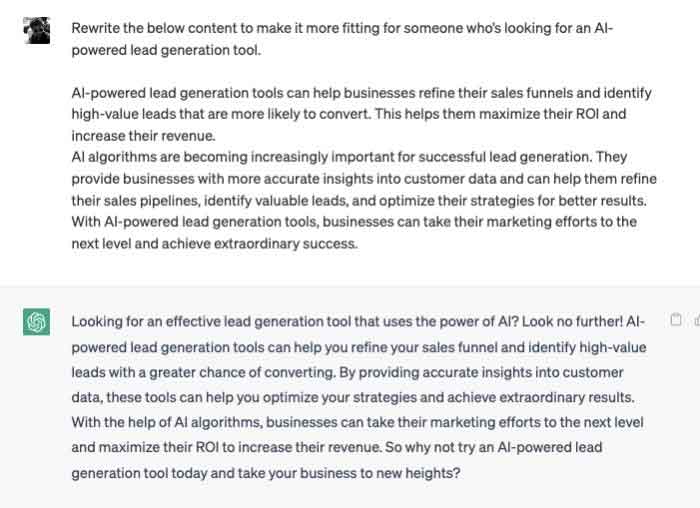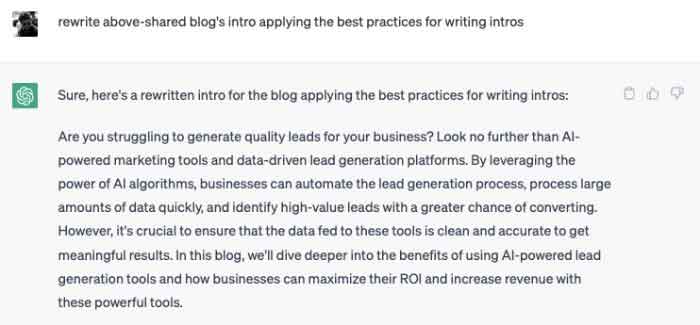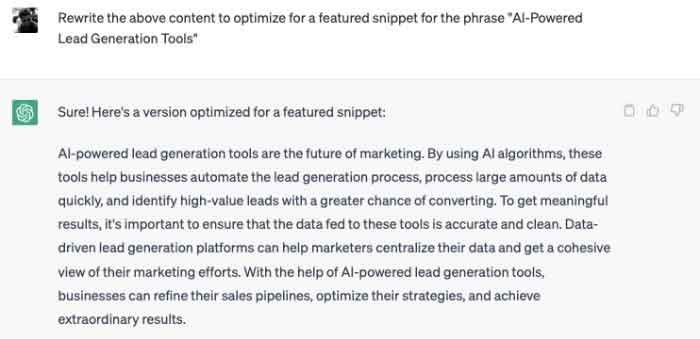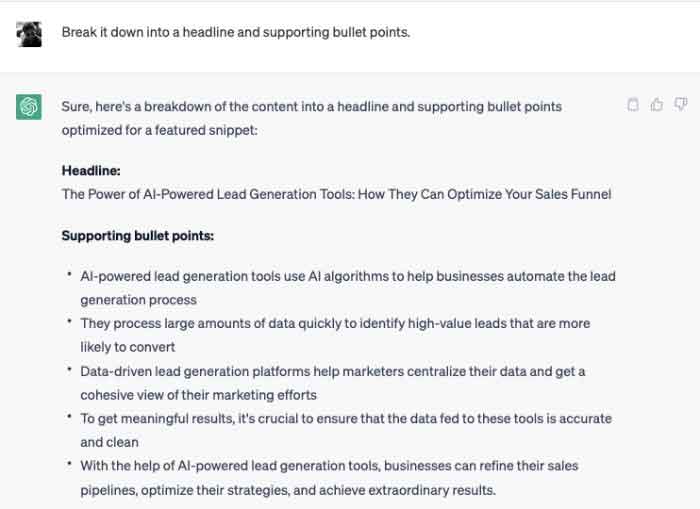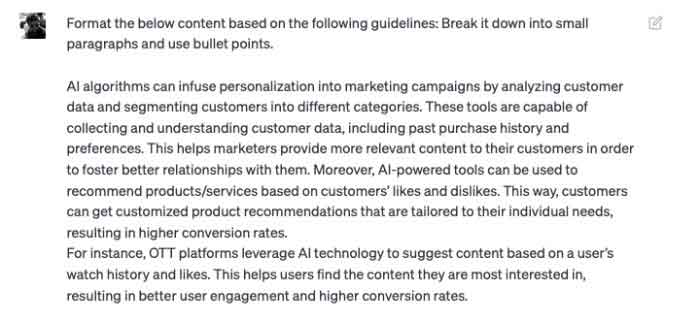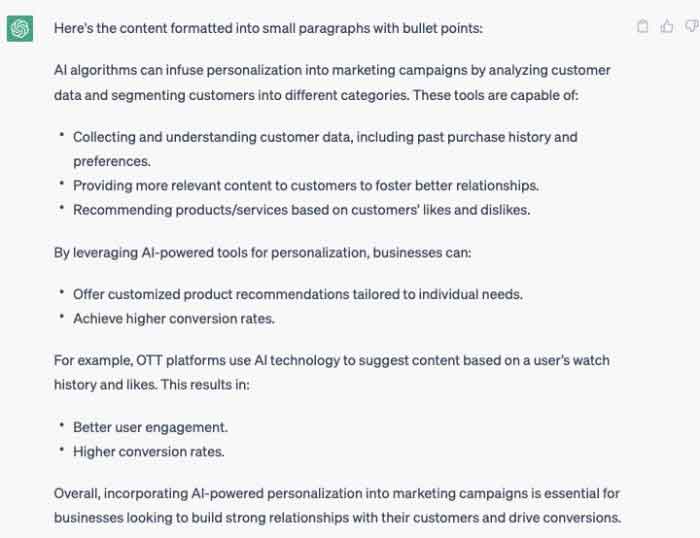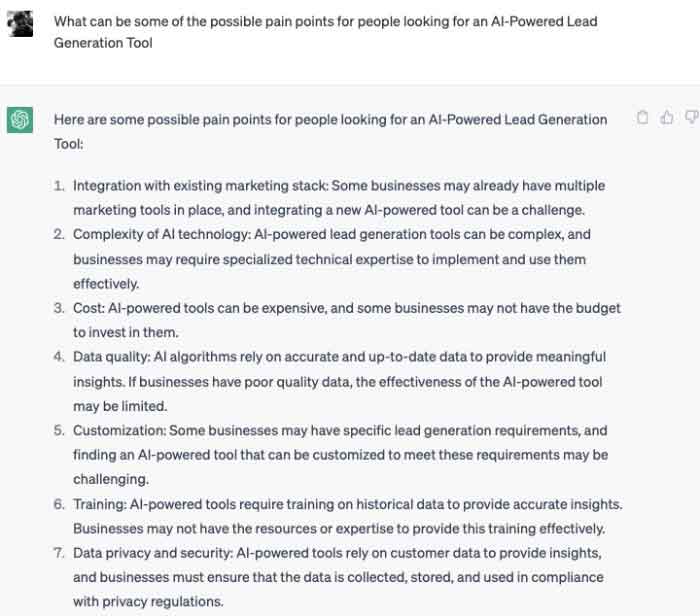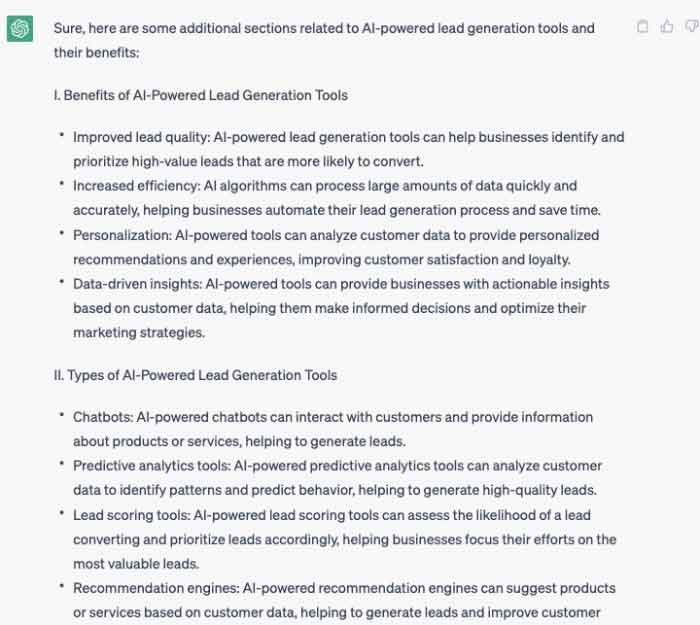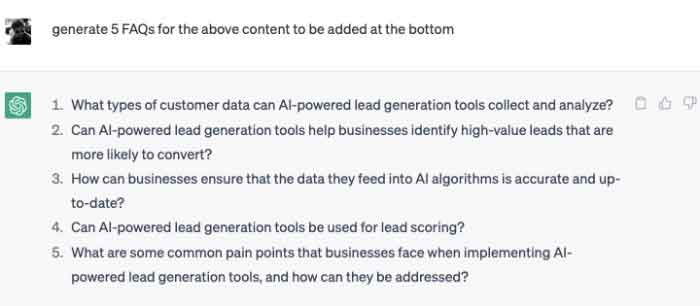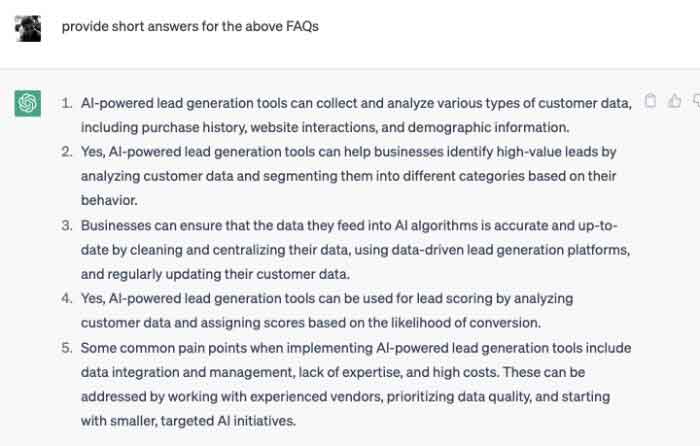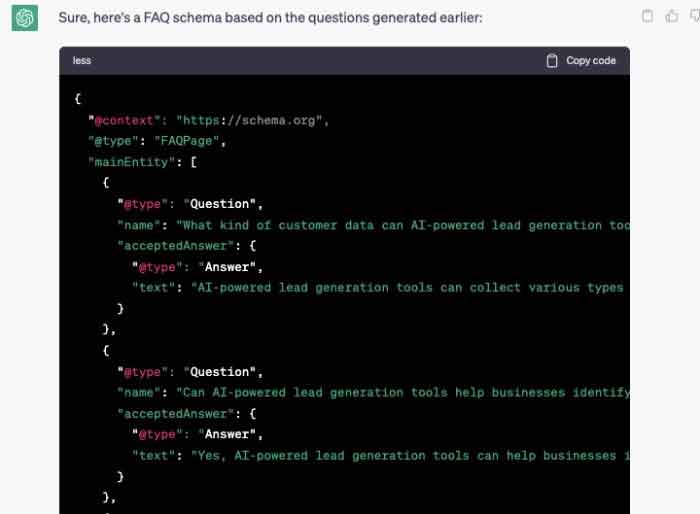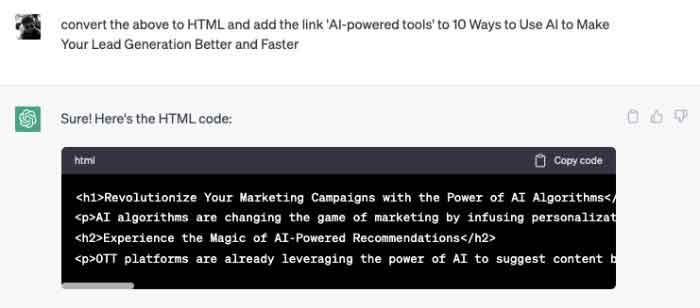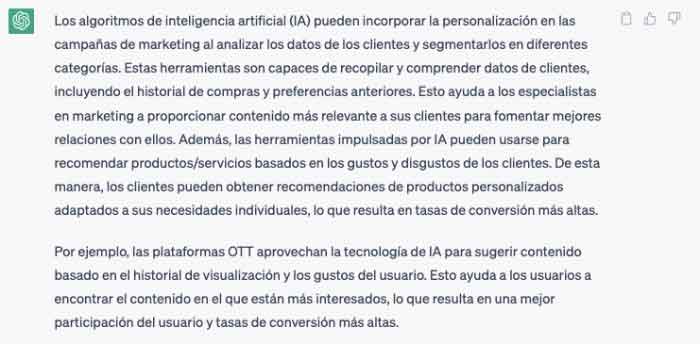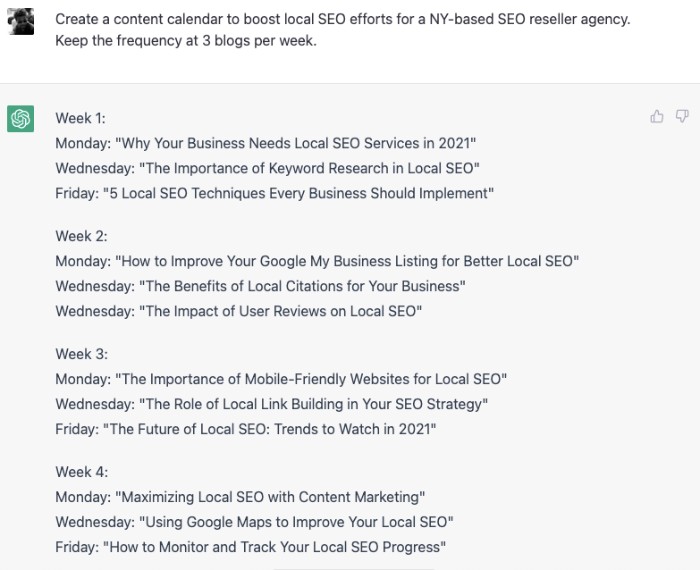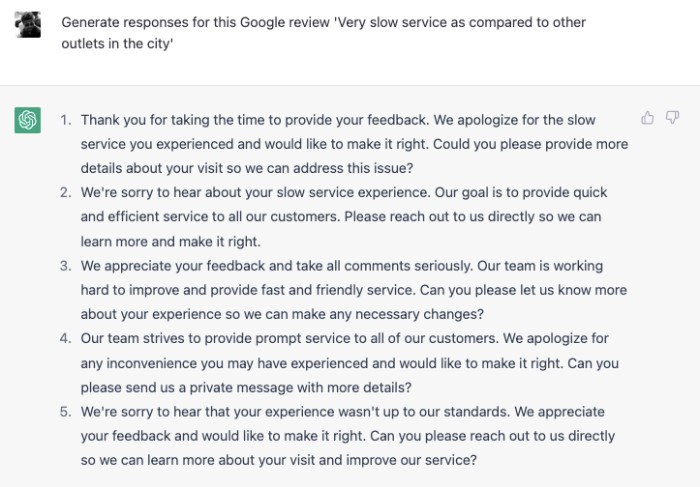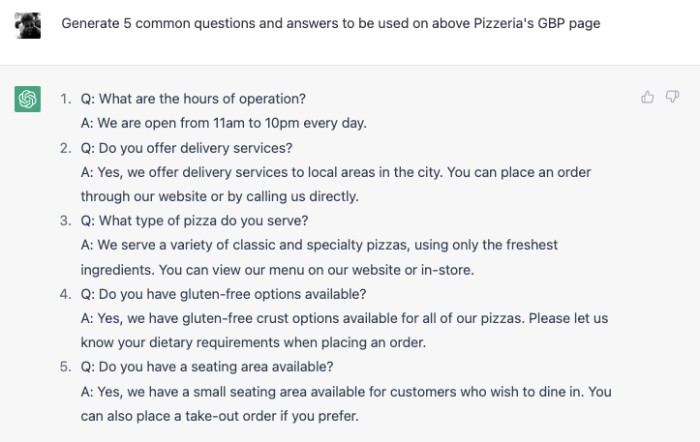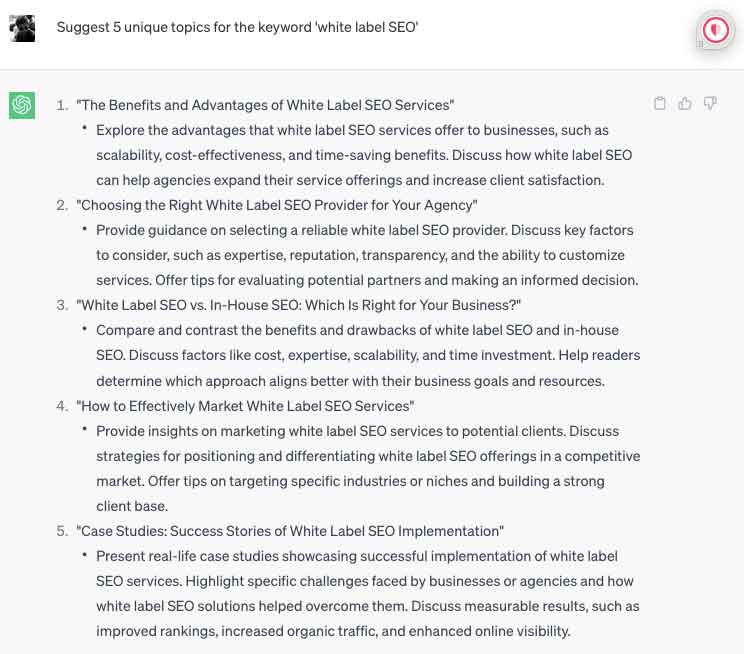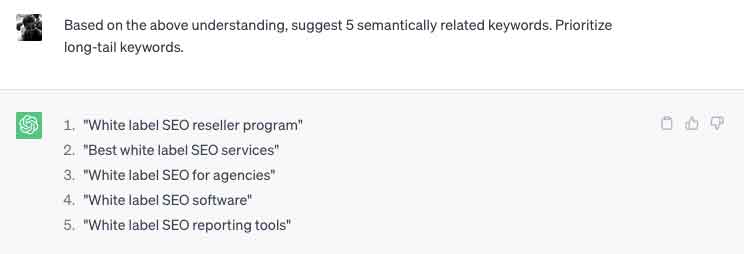ChatGPT is the perfect tool for SEO specialists looking to turbocharge their strategies. This advanced AI language model, developed by OpenAI, helps you optimize your keywords and generate high-quality content that will supercharge organic visibility and drive traffic to your websites.
With ChatGPT’s rich capabilities, you can use it as a powerful resource to get an edge over competitors in today’s digital age and maximize online growth opportunities efficiently.
Understanding What ChatGPT Is
ChatGPT is a groundbreaking artificial intelligence developed by OpenAI that can understand and generate human-like text. It builds upon the GPT (Generative Pre-trained Transformer) architecture to produce state-of-the-art results in language tasks such as answering questions, continuing conversations, and creating unique content pieces. Its training process involves exposure to various internet sources which helps it to learn grammar rules, contexts, and other nuances associated with natural conversation.
ChatGPT makes user interactions feel much more natural than before while opening up numerous application opportunities from customer support bots or aiding programming workflows through creative content production – revolutionizing how humans interact with AI technology today!
Strategies for Using ChatGPT For SEO
To leverage ChatGPT for SEO, a good starting point is generating ideas. You can command ChatGPT to develop 50 blog post concepts that are aptly optimized for search engines. As you create compelling headlines and summaries, keep in mind they should both be intriguing enough to attract readers.
Once you have an assortment of potential article topics from the AI toolkit, filter out those that immediately grab your attention. Chances are they’ll resonate with other users too. Aim at having variety among these subjects to not only provide value but also maintain reader interest across different areas.
As part of this process, don’t stop there! Request additional suggestions aligned with prior selections until you’ve built up a solid list that aligns well with your website’s goals or themes. Remember these tips: adding contemporary relevance like ‘in 2023’ within titles improves their appeal while structuring them into lists could draw even more clicks.
Ways to Use ChatGPT for SEO
Start with something simple: Generate blog outlines using ChatGPT. Although it doesn’t take charge like Clearscope or Content Harmony, generating an outline can provide creative fuel.
Consider using ChatGPT as a research assistant. It won’t replace hands-on data gathering, but it can certainly expedite your process by compiling stats quickly. Lastly, exploit its ability in rewriting content and edit tasks.
Remember that exactness is crucial here; otherwise, you’ll receive just a rough sketch instead of finely sharpened prose. Bear in mind, though, while deploying any artificial intelligence tools, including ChatGPT, that unchecked reliance could expose your site to risks due to possible inaccuracies, which may creep into the context due to AI’s inherent limitations at present.
Keep in mind, these are only guides. They cannot replace human writers who bring unique perspectives and creativity to the process. Accuracy checks on facts provided help keep relevancy intact, taking into account real-time changes that occur across the web landscape related to topic inputs from various sources.
1. Using ChatGPT for Content Creation
With this technology, businesses have seen improved time efficiency when producing blog posts and web copy, meaning more organic leads with less effort! For example, by providing key phrases or topics related to a field of study, ChatGPT will generate relevant text based on known information from the internet. Additionally, its automated grammar checker ensures all output is free from errors before publishing, perfect for busy marketers overseeing multiple projects simultaneously!
Understanding the Role of ChatGPT in Content Creation
To successfully leverage ChatGPT for the SEO content creation process, it’s vital to understand the distinct role this AI-powered tool plays. As a language model developed by OpenAI, ChatGPT is designed to streamline tasks such as ideation, outlining, and content generation while working synergistically with human intelligence. You can create search engine-friendly content that resonates with targeted readership groups by harnessing its capabilities alongside keyword research tools and manual editing processes for optimization purposes.
Keep in mind that Google doesn’t expressly forbid AI-generated copy, instead focusing on delivering high-quality user experiences irrespective of how the output was created, whether through artificial or purely human efforts.
Therefore, it is important to have a people-centric mindset when creating articles. Having this attitude and an earnest wish to inform or persuade will help you avoid any legal issues. Additionally, it will establish you as an authoritative source of information within your market.
Create Blog Posts
ChatGPT acts as a reliable writing assistant that complements your skills. Generating outlines and ideas can jumpstart the drafting process of your blog posts. However, relying solely on AI-generated content may not always be ideal when considering factors such as search rankings, optimization, or accuracy.
To enhance your content’s performance in terms of SEO, incorporating a strategic ChatGPT SEO strategy is advisable. This involves using ChatGPT to develop the initial content framework while integrating essential keywords naturally, which can subsequently be fine-tuned by you to ensure accuracy and relevance.
Here’s an example of how it can be used to create a blog post for any given topic. You can change the prompt to meet your requirements.
Finding the perfect balance between using an AI tool like ChatGPT and employing other keyword-focused tools (for example, Clearscope or Content Harmony) which help optimize articles for improved search results visibility. Moreover, fact-checking remains essential since incorrect information from ChatGPT might slip through occasionally, so make sure you verify any generated data before publishing. While human editors are still indispensable in ensuring quality control over rewritten or edited workpieces, especially concerning preventing inaccuracies, leveraging ChatGPT can assist with tidying up certain elements within an article, provided the prompts given are specific enough.
ChatGPT provides a valuable support system for content creators, particularly in the SEO-optimized blog post arena. However, always exercise caution and double-check any information handed to you by AI assistants. Thus, remember that collaboration between human writers and AI is key: incorporate your creative thinking with ChatGPT’s processing power to unlock fresh new takes on topics—boosting search rankings while maintaining quality standards!
Create Subsections, Meta Descriptions, and Short Content Blocks
ChatGPT SEO content creation offers an effective way to optimize your web pages for search engine visibility while providing a positive reading experience. It involves carefully crafting subsections, meta descriptions, and short blocks of pertinent information that are optimized with keywords while remaining engaging for readers. This combination generates higher click-throughs from SERPs, improving website rankings and engagement levels.
Here’s an example of how you can use ChatGPT to generate subsections and meta descriptions for your content:
Moreover, generating engaging short-form SEO content with ChatGPT enhances social media presence and can be seamlessly repurposed in email campaigns or newsletters without losing relevance. These bite-sized pieces of information are ideal for quickly capturing a wider audience’s attention while boosting the user experience. To effectively leverage ChatGPT when creating these elements requires proper guidance to generate precise responses aligning with desired outcomes.
Provide specific prompts related to each topic area and optimize them based on targeted keyword research findings. However, cautious you remain when utilizing AI-generated output, always ensure thorough reviewing before publishing live, especially fact-checking any data or figures provided within the text since inaccuracies could negatively affect the credibility and lead generation efforts alike!
Create Outlines of Blog Posts
ChatGPT can help you quickly create a well-structured and researched blog post, giving your content the foundation it needs. To get started, provide specific prompts or keywords related to your desired topic; this will guide ChatGPT in generating relevant ideas. You should also ask questions with each prompt along with the expected word count for better accuracy of results.
With these inputs, we can develop an effective outline that forms a strong structure before commencing actual writing tasks!
Once you receive the generated outline from ChatGPT, carefully review it. Check for the accuracy and relevance of each point, as relying solely on artificial intelligence may result in errors or outdated information being incorporated into your post. Consider integrating additional research or resources beyond what’s provided by AI-generated suggestions if needed.
After fine-tuning your blog post outline, optimize it further by incorporating SEO best practices like keyword targeting and usage throughout headings/subheadings (H1/H2 tags). Additionally, take note of other ranking factors such as user experience (including readability) and authority signals, backlinks (internal/external), and E-E-A-T guidelines (Experience, Expertise-Authoritativeness-Trustworthiness). Using ChatGPT when creating an outline is just one part of improving SEO efforts.
It’s crucial not to neglect other aspects contributing further towards attracting search engines and maintaining a high-ranking position. Utilize chat generators wisely, maximizing their potential while still considering the human touch necessary for editing and ensuring the overall quality of the work!
Create Free Tools
Unlocking the potential of ChatGPT for SEO relies on understanding its limitations while harnessing its strengths. One valuable use case for professionals is creating free tools to boost their SEO efforts. Using ChatGPT prompts for marketing you can develop interactive resources such as quizzes or calculators that engage users and add value to your website.
To do so effectively, identify a common problem within your industry or niche that needs solving. Next, create an engaging prompt specifying what kind of tool you want ChatGPT to design, alongside clear instructions detailing necessary features and user experience expectations. Although ChatGPT offers intelligent suggestions based on context from various sources, it might lack specific-issue expertise relevant to your target audience’s concerns, especially when compared with human input familiar with current trends in specialized industries.
Once developed, integrate these newly-created digital assets into blog posts or other content types, showcasing their purposeful utility and meaningful insights drawn from them. Doing so will encourage sharing among those seeking solutions related specifically to said issues at hand, ultimately boosting organic traffic, attracting higher-quality leads, and positively impacting bottom lines all around!
Create Data Visualizations and Infographics
Visual aids like data visualizations and infographics can significantly enhance your SEO content. ChatGPT might not be able to create graphics directly. However, it’s an outstanding resource for generating ideas or designing the textual components of these visuals. To effectively use this tool in developing engaging infographics that appeal to both users and search engines alike:
- Begin by providing a clear prompt outlining the subject matter or key points you’d like included.
- Specify if any relevant trends should be represented in chronological order.
- Request bullet-point lists emphasizing essential details, which could then be easily transferred into infographic form.
- Keyword incorporation is crucial; provide specific terms related to your topic for seamless inclusion.
Once armed with text-based suggestions created using ChatGPT for SEO, it is time to collaborate with graphic designers. These professionals are proficient at creating visually impactful representations of complex information patterns. This could include charts, graphs, or diagrams. With this visual aid, user engagement on site pages will be elevated, boosting rankings within search engine results.
Remember that accuracy remains paramount when utilizing AI tools for SEO content creation such as ChatGPT. Always verify statistics presented are up-to-date before finalizing infographics meant for public consumption!
2. Using ChatGPT to Edit/ Refresh Old Content
ChatGPT’s SEO strategy enhances the process of optimizing content for search engines. Leveraging the power of ChatGPT, you can efficiently refresh your existing articles or web pages. By incorporating its suggestions, you can effectively target specific search queries with new keywords and phrases, thus making your content more search engine-friendly.
ChatGPT is also helpful for brainstorming ideas and making sure all sections of a page are up-to-date. It can suggest revisions or new topics that may increase content’s relevance and visibility in search engine results. Its AI-powered writing assistance can also help refine text for accuracy and better readability.
Rewrite for Search Intent
Optimizing content for SEO often requires more than simply adding keyword-rich phrases. It also requires understanding and catering to the needs of search engine users.
ChatGPT can help content creators target search intent more effectively by providing suggestions for how to rewrite or expand existing content. For example, you recently wrote a blog post about 10 ways to use AI for lead generation. ChatGPT can rewrite this post to be more targeted and effective for people searching for AI-Powered lead-generation tool recommendations.
It can suggest changes in the content structure and topics covered to ensure search engine users find answers to their questions.
To dial in the intent a bit more, you can give ChatGPT additional context. This could include sharing the title tags for the top 10 SERP results for the search query, a summary of the content for the first result or the first few results, some of the search suggestions Google returns when you type the topic into Google.com, or some People also ask questions or related searches. By feeding this information to ChatGPT, the platform can make more informed suggestions and better tailor content to the needs of search engine users.
Apply Best Practices to Your Intros and Headings
Headings and intros are often the most read parts of an article or page, making them important for readers and search engines. By utilizing ChatGPT for SEO, you can rewrite intros to focus better on the main topic of an article and add more relevant keywords, phrases, and searchers’ queries.
Let’s go back to our previous example and ask ChatGPT to rewrite our intros to better target the search query “AI-powered lead generation tool recommendations.”
ChatGPT will suggest changes to the intros focusing on lead generation, AI-powered tools, and recommendations. You need to pay a little more attention here, as sometimes ChatGPT can suggest changes that align with best practices. Be sure to review all proposed changes and delete anything that could negatively affect the search engine rankings of your content.
Optimize for Featured Snippets
Integrating ChatGPT into your SEO strategy can yield significant benefits when it comes to optimizing content for featured snippets. By leveraging the capabilities of ChatGPT, you can receive expert suggestions on enhancing your articles’ structure, formatting, and content.
For example, if you want to optimize a blog post for a featured snippet, ChatGPT can suggest changes to the headings and intros to make them more concise and targeted toward search engine users.
The content is good, but as we can see, it’s not yet optimized for a featured snippet. So, we can return to ChatGPT and ask it to break it down into headings and supporting bullet points.
Given the right prompts, ChatGPT can boost your SEO by suggesting adding a table of contents, bulleted or numbered lists, and other formatting elements that help make the content more easily scannable. Additionally, you can use ChatGPT SEO strategy to ensure the content answers any specific questions or queries related to the topic. Search engine users often type in specific questions and expect direct answers in featured snippets. So, ChatGPT can help you craft content that meets those expectations.
Adding Formatting
Readability, structure, and formatting all play a major role in how readers and search engine algorithms perceive content. Manually formatting content can be time-consuming, but implementing ChatGPT in your SEO strategy can do wonders for you.
Here’s how it can help you break down big chunks of content into smaller paragraphs with bullet points and enhance the readability of your content:
Generate Ideas for Additional Topics or Subsections
Sometimes the content may overlook crucial aspects or subsections related to the primary subject. In such cases, incorporating ChatGPT into your SEO strategy can prove invaluable. ChatGPT possesses the capability to identify these potentially overlooked topics and assist you in their effective composition. This approach enhances your content’s comprehensiveness and relevance, contributing to an improved SEO strategy.
For example, we can ask ChatGPT to provide additional insights to enhance the depth of our previous article using a set of related questions as prompts.
We can easily generate additional topics to cover in the blog by changing the prompt. For example, if we ask ChatGPT to provide additional sections related to AI-powered lead generation tools and their benefits, it will come with ideas to help you write more content.
The opportunities are endless when using ChatGPT for SEO to generate ideas for additional content. The more you use the tool, the better it provides tailored suggestions that match your topic.
Add FAQs and FAQ Schema
FAQ sections are a great way to provide useful information to readers and possibly increase organic traffic from search engine users. Additionally, adding FAQ schema to the content helps the search engine to better understand the context of your content and display it as a featured snippet.
Leveraging ChatGPT for SEO can help you generate FAQs and the associated schema. Let’s say we wanted to add FAQs in our previous example about AI-powered lead generation tools. All we need to do is ask ChatGPT to generate the FAQs.
We can go back and ask ChatGPT to provide short answers to these questions.
Now that we’ve our FAQs in place, all we need is to ask ChatGPT to create a FAQ schema for our article. It will generate the JSON-LD code that we can add to our blog post to enable FAQs in search engine results pages.
Update Outdated Information
Initially, ChatGPT for SEO was limited to generating content from training data created before 2021. But now, it can browse internet content for the latest information and modify or update outdated information if required. Using this feature, we can ask ChatGPT to scan online content for the latest information related to our topic and update our blog post.
For example, if we ask ChatGPT to search for the latest information related to AI-powered lead generation tools, it will find new relevant studies and reports that can be used to update the blog post. It will also suggest additional topics related to the newer data.
You can use ChatGPT in your SEO strategy to summarize reports and studies, find the latest versions of old reports, or surface annual reports related to your topic.
Rewrite for Style and Tone
Brand style and tone are important for content marketing and storytelling. It’s the key to maintaining a consistent voice across your content.
Complementing your SEO with ChatGPT can help you rewrite content to match the desired style and tone. You can give it a few sample pieces of your writing or use its built-in style models to set the desired mood, tone, and sentiment.
Using this feature, we can ask ChatGPT to rewrite our blog post with a more sympathetic or sensational to engage and relate to our readers. It will use the same facts and data points, but it’ll be written in a more relatable way.
We can also ask ChatGPT to rewrite the content in a more casual or conversational tone.
Convert Post to HTML and Add Internal Links
ChatGPT can help you convert posts from Google or Word Docs to HTML. It can also add internal links to an article if you have a list of URLs and anchor texts.
For example, if we asked ChatGPT to convert our blog post about AI-powered lead generation tools to HTML and add internal links, it would generate the HTML code and insert the appropriate hyperlinks.
This feature is especially useful if you want to publish a post on a website without design experience or resources. It can help you quickly and easily create a post optimized for search engine visibility.
Translate Content
Last but not least, the ChatGPT SEO strategy can help you translate content from one language to another.
For example, if we wanted to translate our article about AI-powered lead generation tools into Spanish, we could ask ChatGPT to do it for us. It will generate a complete translation of the article ready to be published on the website.
Note that these translations may not be perfect and should still be QA’d by a native speaker before publication.
ChatGPT is an all-in-one content creation and optimization tool. It can help you generate new content, update outdated information, rewrite for style and tone, convert posts to HTML and add internal links, and translate content.
3. Using ChatGPT for Local SEO
With its advanced natural language processing capabilities, it can provide SEO experts with accurate and detailed information about keywords, enabling them to optimize their clients’ websites for search engines. This will help them create an effective SEO content plan to boost their website’s ranking in LSEs.
Local SEO needs to be done right to rank higher on search engine result pages (SERPs), and ChatGPT SEO strategy can help small businesses achieve that goal with ease. By using the tool as part of your overall strategy, you’ll quickly see success across organic rankings because Google will notice the improved engagement from customers related to their queries or searches about services within a certain geographical area.
Optimizing Google Business Profile (GBP)
Optimizing your Google Business Profile (GBP) with ChatGPT SEO strategy is an effective and efficient way to rank higher in search engine results. It allows you to quickly capture customer attention, increase visibility for your business, and target specific demographics of customers who are searching in the local area or industry.
By utilizing ChatGPT for SEO, you can easily customize content optimally suited for users while optimizing overall ranking performance at a regional scale. Its ability to generate locally-focused keywords and rich snippets provides businesses across any vertical the opportunity to dominate their market position online by cornering available leads before anyone else even knows they exist.
Here’s an example of how you can use ChatGPT to generate the required information for optimizing your Google Business Profile:
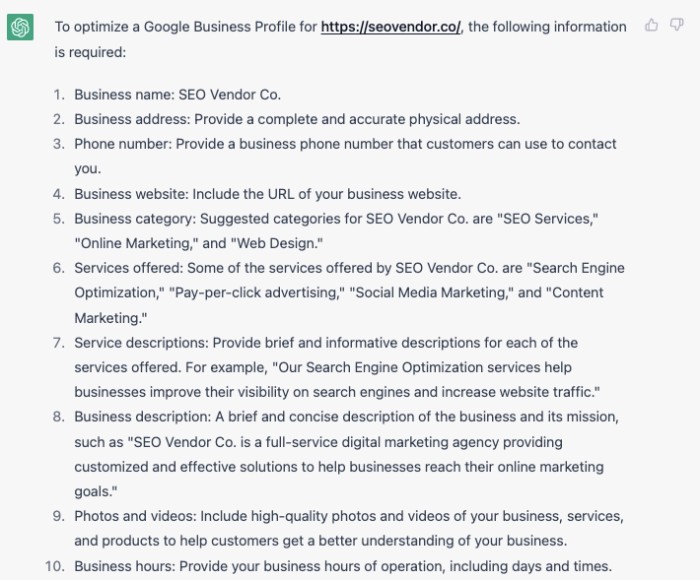
Note that ChatGPT cannot read the webpage. To generate more effective descriptions of the business, it is important to use a combination of both natural language processing and manual input.
Here’s what it came up with when we provided it with a summary:
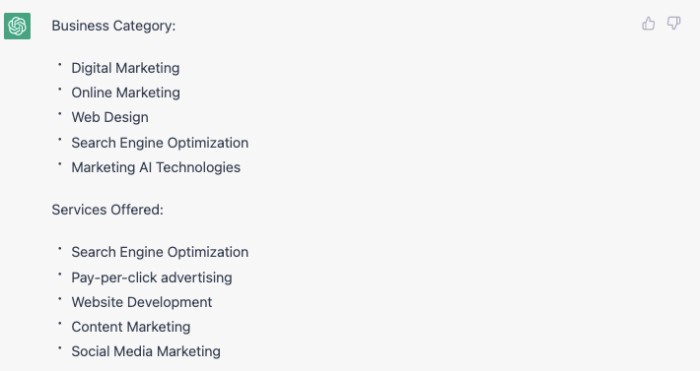
You can generate more detailed descriptions like service descriptions and business descriptions. Here’s an example:
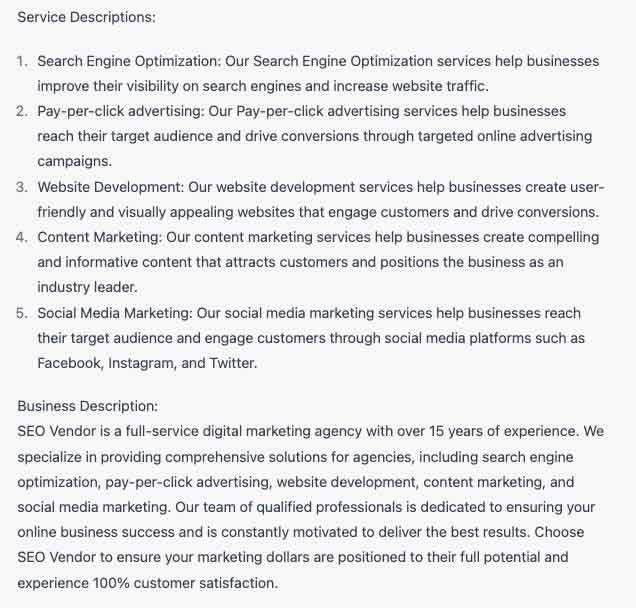
Creating Content for GBP and Local Pages
Creating content using the ChatGPT SEO strategy can help local businesses rank higher in search engine results. This powerful tool combines natural language processing and machine learning algorithms to create optimized content that is tailored specifically to your business’s needs.
Through a series of chat-like prompts, you can generate high-quality copy that speaks directly to your target audience and increases its chances of ranking well in SERPs. It allows local marketers the opportunity to stay ahead of their competitors by creating engaging copy suited to their respective markets—all without sacrificing quality or accuracy!
Here’s an example of how you can use ChatGPT to create a content calendar for your agency.
Note that if you’re using ChatGPT 3.5 (free version) for SEO, it has been trained on data that is limited to 2021, so it may not be able to generate content for upcoming years. Now, this is just a reference. You can use it as a starting point and narrow down the topics.
Additionally, ChatGPT’s natural language processing also gives you options for creating content that can help you improve your local SEO performance. Not only you can generate topics, but it can also help you create content that is optimized for the local area, giving you a better chance of achieving higher rankings in SERPs.
Here’s how you can do it:
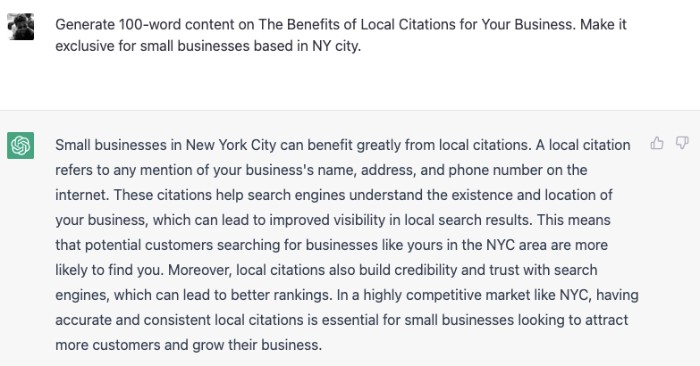
For illustrative purposes, we’ve generated only 100-word content, but you can use ChatGPT for SEO to generate long-form content as well. Make sure to perform a quality test and proofread it before publishing it.
Building Local Citations
Citations are a powerful tool for local businesses to build online visibility, and ChatGPT can help marketers make the most out of them. It can help you build and optimize citations with ease.
ChatGPT for SEO can help you generate a list of websites and directories where you can itself your agency to maximize citations to achieve higher rankings in local search results. Here’s an example:
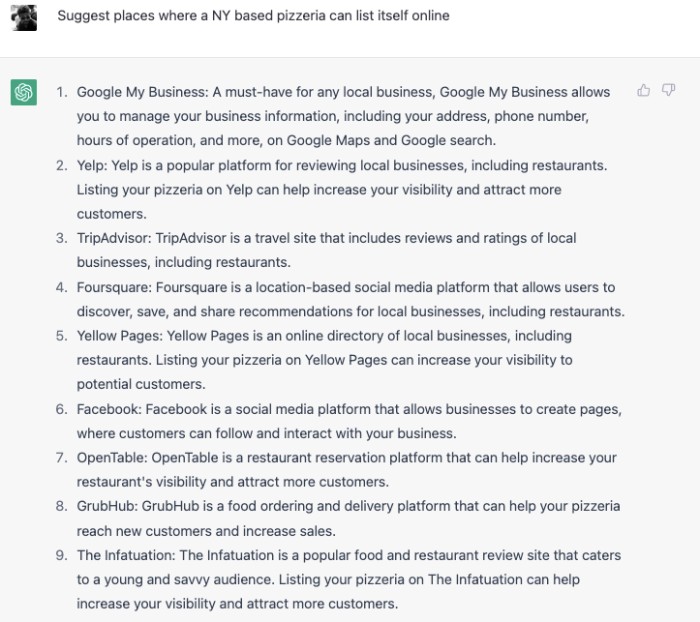
If you’re not satisfied with the results, you can modify your ChatGPT SEO strategy to produce a list of websites or directories which are exclusive to a particular locality or industry.
Creating Google Business Posts
The power of ChatGPT for SEO does not end with content creation and local citation building. It can also help you create posts for Google Business Profiles.
Using ChatGPT SEO strategy, you can create tailored content that not only engages customers but is also optimized for search engine rankings. From automated posts about new products or services, upcoming events and promotions, hot topics in the industry, or helpful advice. These post types all contribute to increased visibility on SERPs.
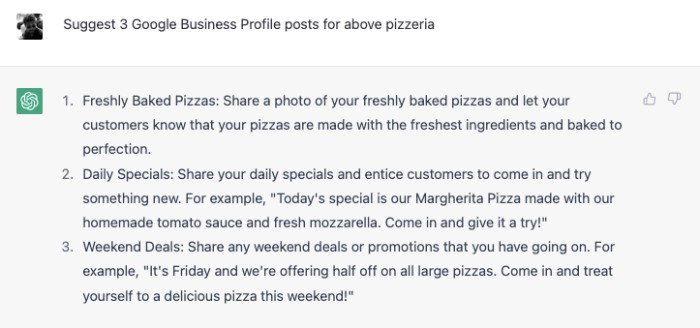
Best practice strategies include using keywords observed from competitor research and focusing on customer interests by featuring share-worthy visuals like videos and photos, which will ultimately boost customer satisfaction while improving overall ranking potential too!
Creating Social Media Posts
It’s no secret that having an active and engaging presence on social media can help marketers to build brand awareness and recognition for their clients’. But coming up with ideas for social media posts and then developing them can be time-consuming.
With ChatGPT SEO strategy, they can generate content on almost any topic, giving them access to a wide range of potential topics for your posts. It can also help them to create optimized social media posts for each platform. For instance, a post that’s optimized for Twitter may need to be shorter and more direct than a post optimized for Facebook or Instagram, which will require more storytelling and visual elements. Here’s an example of how to do it:
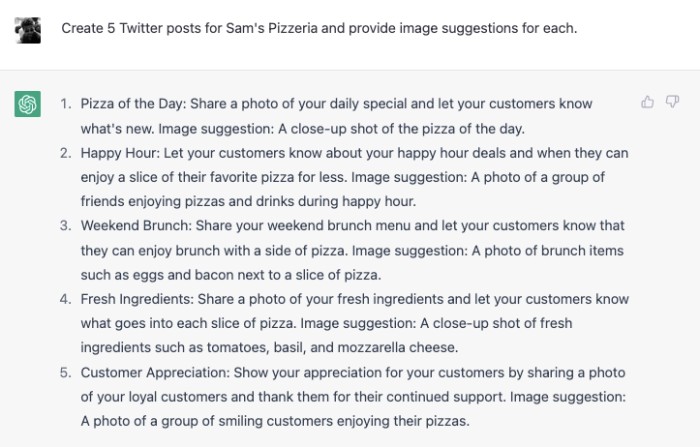
You can also use ChatGPT for SEO to optimize these tweets for Facebook or Instagram posts, as illustrated below:
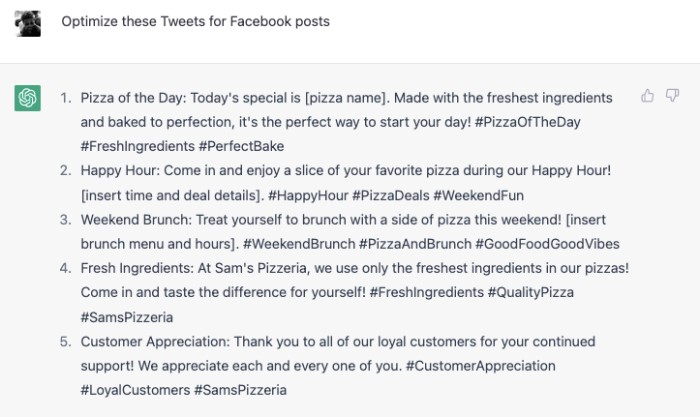
Responding to Google Profile Reviews
Crafting an effective response strategy towards reviewing websites involves taking into account positive reviews just as much as negative ones—both significantly impact visibility on SERPs either positively or negatively depending upon content critiqued therein.
A prompt yet professional acknowledgment makes customers feel heard and appreciated. Creating detailed rebuttals that include evidence pertaining to specifically stated claims bolsters authenticity while maintaining professionalism even if disagreements exist between users’ opinions/experiences versus your own.
ChatGPT SEO strategy can help you craft responses for your Google reviews or online mentions. With its advanced natural language processing, ChatGPT can generate multiple responses to different reviews while maintaining the tone of your business or your client’s business. This will help you improve your client’s online reputation and attract more customers.
Here’s an example of how you can use ChatGPT to generate responses to a negative review:
Creating Questions and Answers for GBP
Creating questions and answers for Google Business Profile may seem like an intimidating task, but it does not have to be that difficult. With a few simple steps on how to use this powerful tool, you can easily craft engaging content that ranks high in Google.
For instance, ChatGPT can help you come up with relevant and interesting questions to ask your customers. It can also generate answers to those questions, making it easy to optimize your GBP. Once you have the questions and answers, you can use them to create a Q&A page on your GBP. This will help you to boost your visibility and attract more customers to your business.
Here’s an example:
ChatGPT for SEO is a powerful tool that can be used to help local businesses rank high in Google. With Chat GPT SEO strategy, you can create unique ad content tailored to your specific target market, track the impact it has had on your search engine rankings, and adjust accordingly as needed to gain better visibility among potential customers searching online.
Additionally, implementing keywords relevant to relevance and locality ensures greater accuracy when showing up in local searches. Further increasing the chances of success in this highly competitive field. All of these features make ChatGPT an invaluable resource for any local business looking to stay ahead of the competition. As an SEO expert, you can use ChatGPT to help your clients achieve higher rankings in the local search engine results and then track their progress over time.
4. Building Quality Backlinks Using ChatGPT
Consider ChatGPT SEO strategy for link-building. This approach is the best way to acquire valuable links from relevant websites, thus boosting SEO efforts.
Furthermore, this technique uses natural language processing algorithms that can generate content based on user input, which aligns with Google’s E-E-A-T guidelines—ensuring only quality content gets published. In addition, ChatGPT for SEO also assists in managing these activities quickly as it uses automated systems for efficient execution and implementation at scale without compromising on the accuracy or consistency of output results!
Generate High-Quality, Relevant, and Helpful Content
High-quality, relevant, and helpful content is vital in building quality backlinks for your website. By utilizing AI-powered SEO tools like ChatGPT, you can efficiently generate captivating articles or blog posts that resonate with your target audience.
To begin, input key topics related to your niche or industry into ChatGPT. The tool will provide suggestions ranging from intriguing titles to comprehensive outlines. Once you’ve selected an appealing concept from these generated ideas, refine it by adding detailed information tailored specifically for readability and engagement purposes.
That way, potential readers feel compelled to share the content on their platforms! As more people discover and appreciate what you offer through sharing links online, organic traffic grows while fostering trust among search engines indexing each new link found pointing toward your website.
Perform In-Depth Keyword Research
Thorough keyword research plays a significant role in your success when building high-quality links. Utilize ChatGPT SEO strategy to streamline this process by suggesting relevant keywords based on your input.
To effectively use these tools, begin with seed keywords that embody your niche or industry, then leverage ChatGPT’s SEO capabilities to uncover related terms and expand your list. After generating an extensive set of potential selections, employ keyword analysis tools to evaluate search volume and competitiveness for each option. Focus particularly on long-tail phrases for precise targeting opportunities.
By prioritizing these metrics alongside relevance when finalizing candidate choices, you’ll create a robust foundation upon which compelling content can be built, ultimately leading to more effective link-building campaigns powered by artificial intelligence assistance from platforms like ChatGPT.
Optimize Anchor Text with ChatGPT
When optimizing anchor text with ChatGPT, focus on diversifying your link profile for improved SEO results. Integrating long-tail keywords within natural-sounding phrases boosts the effectiveness of your backlinks. Begin by using ChatGPT for SEO to generate a list of diverse and relevant anchor text suggestions based on your selected target keywords.
Proceed by assessing these proposals; strive for variety while maintaining relevance to avoid over-optimization penalties from search engines. Analyze existing backlinks using an SEO tool, identifying opportunities for optimization in terms of diversity and relevancy. Approach site owners hosting those links diplomatically and request them to update or refine suboptimal anchor texts when necessary.
Leveraging ChatGPT for SEO can significantly streamline the process of creating diversified yet hyper-relevant, content-rich anchor texts that contribute positively towards better ranking performance without compromising website quality or user experience.
Personalize Your Outreach Emails
Personalize your outreach emails as you pursue quality backlinks. ChatGPT SEO strategy can help you craft tailor-made messages that resonate with your target audience and convey genuine interest in their work or content. Start by conducting thorough background research on each prospect to identify common ground, such as shared interests or industry affiliations.
Utilize ChatGPT’s unique capabilities to generate email subject lines that capture attention while remaining relevant and concise. In the body of your email, express appreciation for their expertise and highlight specific aspects of their website or content that caught your eye. Incorporate these insights into customized pitches detailing how collaborating would benefit both parties mutually.

Lastly, remember to be respectful of the recipient’s time by keeping emails brief but engaging. ChatGPT will be invaluable during this process!
Automate Response Management
Effectively managing responses from your link-building outreach is vital for successful campaigns. ChatGPT for SEO can streamline this process by automating communication and handling follow-ups with potential link partners. Utilize AI to analyze incoming emails, categorize them based on their content, and respond accordingly using pre-written templates crafted with the help of ChatGPT.
For more complex or personalized responses that require human intervention, use AI-generated suggestions as a starting point to craft engaging replies quickly. Keep track of ongoing conversations while monitoring conversion rates to optimize future email sequences further. By leveraging automated response management powered by ChatGPT, you can save time and resources while maintaining professionalism and efficiency in your backlinking efforts.
Broken Link Building
Broken links present an opportunity to build quality backlinks by offering a solution for the website owner. Use a broken link checker to identify broken links on potential websites within your niche. Once you have the list ready, analyze broken links to determine the topic and format of the original content.
Leverage ChatGPT SEO strategy to create high-quality replacement content that fits with the previous content on that broken link. Reach out to sites in your list with personalized emails using persuasive ChatGPT-generated messages informing site owners of their broken links and proposing your upgraded resource as its replacement.
Build Resource Page Links
Resource pages are valuable for your link-building efforts, as they consolidate helpful information and resources in a specific niche. To build quality backlinks from resource pages, use ChatGPT for SEO to identify relevant sites with existing resource sections. Once you’ve compiled a list of potential targets, create compelling content that offers unique value or expertise not found on their current lists.
Reach out to the site owners using personalized emails crafted by ChatGPT and highlight how your content can enhance their resource page further. Showcase its benefits for their audience without sounding overly promotional, making them more likely to consider featuring your material with a well-earned backlink. Regularly update and improve upon this content to maintain interest from these sites while continuously attracting new inbound links.
Draft Guest Post Pitch
Drafting a compelling guest post pitch is essential for securing high-quality backlinks from industry-relevant websites. To create an effective proposal with ChatGPT’s assistance, first research your target site and understand its audience, content style, and preferred topics. Then, brainstorm several unique article ideas that align with the host website while showcasing your expertise.
Use ChatGPT SEO strategy to refine each idea into a captivating title and brief outline highlighting key points you’ll cover in the guest post. Ensure these titles demonstrate value to the publisher’s readership and overall content strategy. When crafting your email pitch using ChatGPT-generated templates, clearly communicate why your proposed topic benefits their audience while also expressing appreciation for past work they’ve published or any shared connections.
Following this approach will enhance your chances of establishing rapport with webmasters and increase your prospects of creating successful partnerships yielding valuable backlinks.
Collaborate With Influencers
Working with influencers presents an excellent opportunity for link-building, as they often have established trust and authority within your niche. Use ChatGPT SEO strategy to identify suitable influencers based on their relevance, audience size, and engagement levels. Reach out to selected individuals using personalized email templates created by ChatGPT that highlight the mutual benefits of the collaboration.
Inform them about your content and explain how it could benefit their followers. When collaborating with an influencer, consider offering incentives such as free products or services in exchange for mentions or backlinks from their preferred platform (e.g., blog posts or social media). This partnership increases referral traffic and boosts brand visibility across different channels.
Advanced Tracking and Reporting
Monitoring your link-building progress is crucial in optimizing your strategy. ChatGPT for SEO can help you achieve better insights into the effectiveness of your campaigns by automating data collection and analysis.
Begin by setting up a tracking system to measure key performance indicators (KPIs), such as acquired backlinks, referring domains, traffic growth, rankings, and conversions. Use AI-powered tools for efficient monitoring across various platforms while identifying patterns or trends influencing campaign success. Leverage these analytics reports generated with the assistance of ChatGPT to make informed decisions on adjusting outreach efforts or refining content creation processes accordingly, ultimately boosting overall SEO results through more effective advanced tracking and reporting practices developed using artificial intelligence technologies like ChatGPT.
Reducing Time Spent on Feasibility Analysis
You can fully tap into ChatGPT’s SEO potential to cut down on feasibility analysis time. Often, you may find yourself mulling over keyword strategies or testing new content ideas. Instead of spending countless hours in these deliberations, let the AI assistant do it for you.
Just provide a brief of your idea or concept and allow the machine learning model to suggest relevant keywords and phrases. You’ll have an output based not only on global trends but also tailored specifically for your brand voice. Similarly, use this tool when exploring new topics within SEO practice areas like schema markups.
Take advantage of its ability to understand the context around popular queries that present opportunities worth pursuing, saving precious brainstorming time at meetings! Remember that efficiency is key here: allowing technology tools such as ChatGPT to take care of routine tasks frees up more space in schedules so teams can concentrate better on complex tasks requiring human touchpoints.
So, optimizing your website using ChatGPT for SEO adds value. It generates quality content that appeals to both users and Google algorithms. With the proper use of this AI tool, you can boost engagement, improve search rankings, and save time on content creation.


